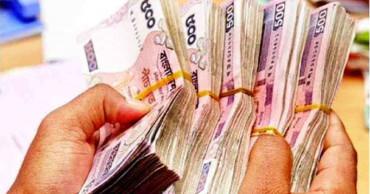South Asian Network on Economic Modeling (SANEM)
Rebased GDP increases per capita income by almost 16%
Bangladesh's per capita income has increased to $2554 (USD) from $2227, a jump of nearly 16 percent, thanks to a new base year for calculating the country's gross domestic product (GDP).
The government recently finalized 2015-16 as the new base year to calculate (GDP). All national accounts will from now on be based on this new base year. Previously the government was using a base year of 2005-6.
Officials at the Bangladesh Bureau of Statistics (BBS) said the marked increase in the size of the GDP itself and attendant changes in per capita income will accrue mainly due to the inclusion of some new sectors in the calculation and price changes between the two periods.
Read:Per capita income in Bangladesh rises to US$ 2,227
Rebasing the GDP is the process of replacing an old base year with a more recent base year to keep up with the evolution in prices. In Bangladesh, the usual practice was to revise GDP base year every 10 years. The last time it was done was in 2013, when the base year was changed from 1995-96 to 2005-06.
However economists contend that increased economic growth and per capita income are not translating to a balanced distribution of national income among the people, leading to increased inequality where the benefits of growth are reaped by the few, not the many. Inequality has been further exacerbated during and by the Covid-19 pandemic, they said.
Selim Raihan, executive director of the South Asian Network on Economic Modeling (SANEM), was one of the economists who raised that point to UNB, even as he conceded there was some benefit from the relatively high economic growth, i.e . GDP growth, and its attendant per capita income growth.
“The ordinary people are benefiting from something. But it remains to be seen whether those gains will contribute to a transformation in the livelihoods of poor people,” he added.
The new base year means GDP figures for every year since will also change. As such, the per capita income for the 2015-16 fiscal year has now gone up to $1737 from $1465 in the old calculation
For the 2019-2020 fiscal, the per capita income has gone up to $2335 from $2024.
The news that Bangladesh had surpassed big neighbour India on the per capita income score, a measure of prosperity, caused a big ripple in 2020. According to the International Monetary Fund's (IMF) latest forecast released last month (October), Bangladesh is likely to maintain that lead through to the next fiscal - a shift from its earlier position that India was likely to quickly regain the lead.
Read: Bangladesh aims to attain 8 per cent GDP growth in 3 years: official document
But now it estimates Bangladesh's per capita GDP at current prices will be $2,138 in 2021, while India's will be $2,116. The rebasing is likely to bump the lead even higher.
India last rebased its GDP in 2015, a change that had bumped up the figure substantially. Nigeria's last rebasing in 2012 increased the size of its economy (GDP) by nearly 90 percent.
Rebasing is important in emerging economies with large informal sectors such as Bangladesh to capture more and more sections of the informal economy under formal reporting of national income, besides new or budding sectors that are growing fast. The new estimate of GDP comprises 21 broad sectors instead of the previous 15.
Talking to the news agency, a BBS official said the main objective of the project was to sensor modernisation of national accounts and related statistics in line with international guidelines and recommendations.
The other specific objective of the project is to improve different methods of GDP compilation. Updating GDP data series (base 2005-06) from 1972-73 to date, and developing a database on GDP (base 2015-16) from 1972-73 to date using software, will also fall under the project.
4 years ago
RMG workforce survey reveals seamless shift to digital payments
Some 67 percent of workers in the RMG sector had reportedly been paid as of May 16, according to a survey.
5 years ago
Experts for Bangladesh-India bilateral cooperation in agriculture
Speakers at a webinar discussion here underscored the need for bilateral cooperation in agriculture between India and Bangladesh to overcome the existing problems caused by COVID-19.
5 years ago


.jpg)

